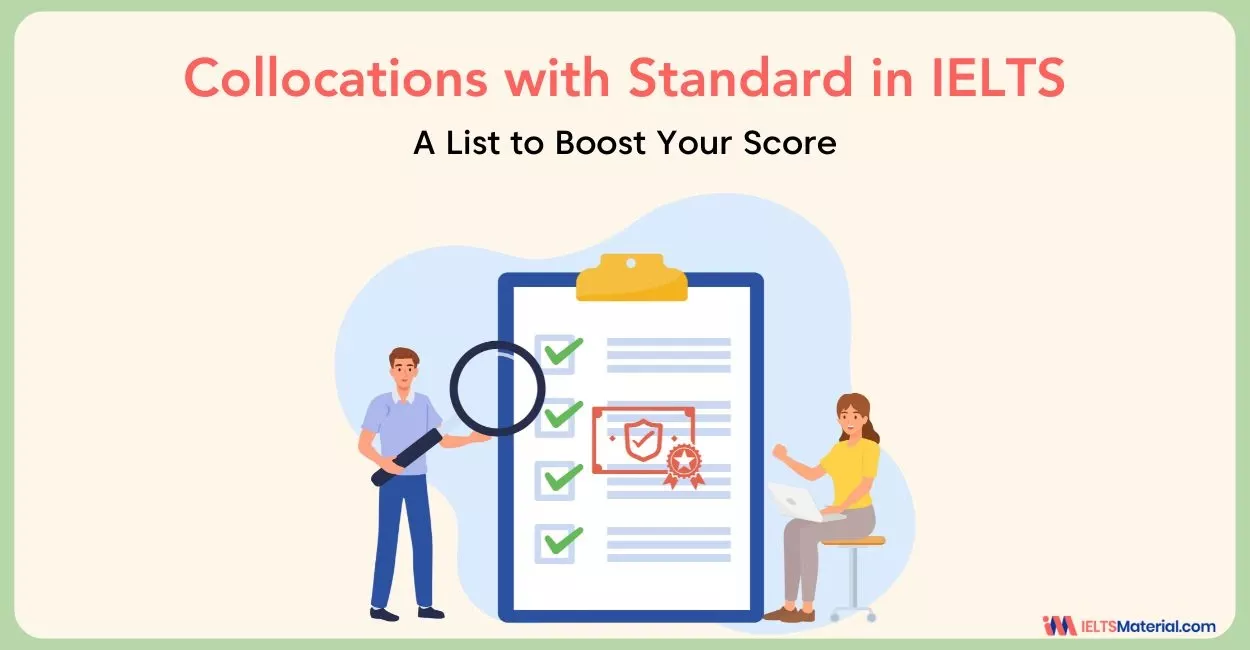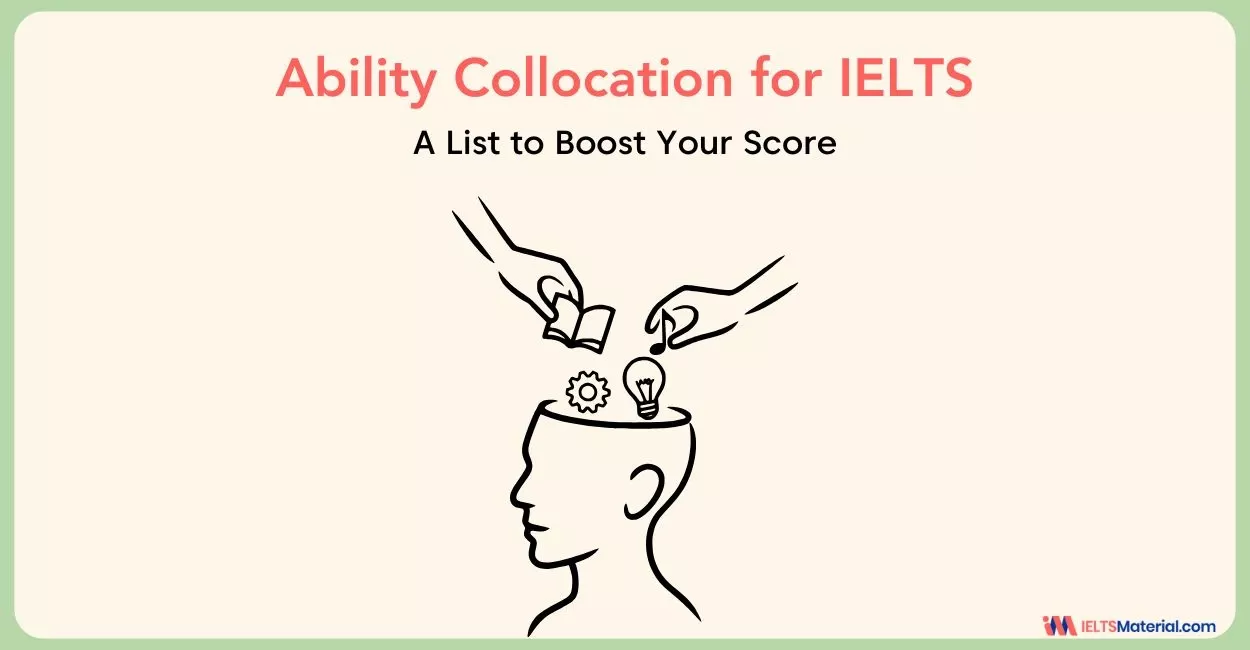Account Collocation for IELTS: A List to Boost Your Score
8 min read
Updated On
-
Copy link
Improve your writing and speaking skills with advanced account collocations for IELTS. Master their meanings, explore real examples, and practice effectively to boost vocabulary range, fluency, and coherence for achieving a higher IELTS band score.
Table of Contents

Limited-Time Offer : Access a FREE 10-Day IELTS Study Plan!
The word ‘account’ is a remarkably flexible word that can be used in both academic and daily life contexts. Its usage ranges from explanation, report, financial record, to perspective. However, repetitive usage of the same word can affect your lexical resources score. As a result, you must add various account collocations for IELTS success.
Therefore, in this blog, we will explore various account collocations with advanced vocabulary word lists for IELTS, categorized into verbs, adjectives, and other useful expressions, to help you enrich your vocabulary.
Lists of Account Collocations for IELTS to Boost Your Score
Collocations make your speech and writing sound smooth and natural. So, account collocations for IELTS are useful across topics like history, media, finance, and personal experiences.
Therefore, we have curated lists of different account collocations for IELTS in the tables below, complete with the meanings and original example sentences, for a better IELTS vocabulary score.
Verb + Account Collocations
The following account collocations show ‘what we do’ with an account, like ‘accepting’, ‘differing’, or ‘providing’ it. Such collocations often appear in IELTS Writing Task 2 essays (especially in argument and report-style answers) and Task 1 academic reports.
|
Verb + Account |
Meaning |
Example Sentence |
|---|---|---|
|
Accept an account |
to agree that someone’s version of events is true |
The committee accepted the witness’s account as credible evidence. |
|
Differ from an account |
to be unlike or inconsistent with another description |
The report differed from the journalist’s account of the incident. |
|
Corroborate an account |
to confirm or support someone’s version of events |
Several studies corroborate the account that technology improves learning outcomes. |
|
Provide an account |
to give a detailed explanation or description |
The author provides a detailed account of climate change impacts. |
|
Give an account of |
to explain or describe something clearly |
In Task 1, you are asked to give an account of the data trends presented in the chart. |
|
Keep an account of |
to record or track something over time |
Businesses must keep an account of their expenses for accurate reporting. |
|
Listen to an account |
to hear someone’s explanation or story |
The examiner listened carefully to the candidate’s account of their travel experience. |
|
Take into account |
to consider or include something when judging a situation |
When writing an essay, you must take into account both sides of the argument. |
|
Call to account |
to hold someone responsible for their actions |
Politicians should be called to account for misusing public funds. |
|
Take account of |
consider or factor in |
Students must take account of time management during the IELTS test. |
|
Set up an account |
to create a profile or banking arrangement |
You must set up an online account to register for IELTS. |
|
Bring to account |
make someone face the consequences |
Those responsible for pollution should be brought to account. |
Common Adjective Collocations with ‘Account’
Adjective + account collocations describe the quality, nature, or accuracy of the description or explanation. They are ideal for academic writing, especially when evaluating information or sources.
|
Adjective Collocation |
Meaning |
Example Sentence |
|---|---|---|
|
Blow-by-blow account |
a detailed and sequential description |
The article gave a blow-by-blow account of the rescue operation. |
|
Clear account |
easy to understand and well-structured explanation |
The student gave a clear account of the research process. |
|
Conflicting accounts |
different or opposing versions of the same event |
There are conflicting accounts of how the historical event occurred. |
|
Fascinating account |
extremely interesting description |
The documentary provided a fascinating account of marine life. |
|
Full account |
a complete or comprehensive description |
The essay gives a full account of the causes and effects of urban pollution. |
|
Graphic account |
a vivid and detailed description, often shocking |
The journalist provided a graphic account of the earthquake aftermath. |
|
Accurate account |
correct and factual description |
An accurate account of data trends is crucial in IELTS Task 1. |
|
Brief account |
a short summary or outline |
In your introduction, give a brief account of the main trends. |
|
Detailed account |
a comprehensive and precise explanation |
He gave a detailed account of how modern farming techniques evolved. |
Adjective + Account Collocations (Person/Story Focused)
These account collocations usually appear when describing stories, reports, or experiences. They add emotional depth and descriptive quality to IELTS Speaking and Writing responses.
|
Adjective + Account |
Meaning |
Example Sentence |
|---|---|---|
|
Eye-witness account |
a report given by someone who saw the event |
The eye-witness account confirmed the police investigation. |
|
Faithful account |
a true and reliable description |
The novel gives a faithful account of life in rural England. |
|
Hair-raising account |
an extremely frightening or thrilling description |
He shared a hair-raising account of his trekking experience in the Himalayas. |
|
Humorous account |
a funny or amusing description |
The comedian gave a humorous account of his travel mishaps. |
|
Sketchy account |
lacking details or incomplete |
The student gave only a sketchy account of the experiment. |
|
Moving account |
emotionally touching or inspiring description |
The speaker gave a moving account of helping refugees during the crisis. |
|
Balanced account |
a fair and unbiased version |
The essay presents a balanced account of the pros and cons of globalization. |
|
Distorted account |
a misleading or inaccurate description |
Social media often presents a distorted account of real-life events. |
Common Expressions and Phrases with ‘Account’
These expressions are used in both formal and informal IELTS contexts. They often appear in idiomatic or figurative uses, showing advanced language control.
|
Expression |
Meaning |
Example Sentence |
|---|---|---|
|
On account of |
because of; due to |
The event was cancelled on account of bad weather. |
|
By all accounts |
according to what everyone says |
By all accounts, Singapore is one of the cleanest cities in the world. |
|
On no account |
under no circumstances |
On no account should you write your name on the IELTS answer sheet. |
|
On someone’s account |
for someone’s sake or because of someone |
She didn’t take the job on her parents’ account. |
|
Give a good account of oneself |
perform well in a particular situation |
The candidate gave a good account of himself during the speaking interview. |
Notes
|
Account Collocation for IELTS: Practice Exercises
In order to check your understanding of the account collocations for IELTS, we have created various exercises given below that you need to complete.
Exercise A: Use the correct form of these verbs.
|
accept differ corroborate provide keep listen to |
- The priest ____________ the old woman’s account of the death of her child with compassion.
- I’m going to ____________ a detailed account of my travels in India. I’m going to write a book when I get back.
- The diaries ____________ a full account of the writer’s experiences in prison.
- Do you think we should ____________ his account of events? Can we really trust him?
- The police only believed me after an eye-witness ____________ my account of the accident.
- There were a number of accounts of the assassination of President Kennedy which ____________ considerably from the official version of events.
Exercise B: Use the following adjective collocations in these sentences.
|
blow-by-blow account clear account conflicting accounts fascinating account full account graphic account |
- I didn’t know who to believe. The two witnesses gave ____________ of the incident.
- We only wanted a brief account of the incident, but he insisted on giving us a ____________ of everything that had happened.
- Our new director gave a very ____________ of his plans for the future of the company. They were well-expressed and easy to understand.
- Her new biography gives a ____________ of her travels in the jungles of Africa. => Yes. It’s very interesting. There’s a scary account of how she was almost killed by a tiger.
- The refugee gave such a ____________ of his torture that I thought I was going to be sick. How can human beings do such terrible things?
- The Prime Minister is expected to give a ____________ of his meeting with the President to Parliament this morning.
Exercise C: Use the following adjectives in these sentences.
|
eye-witness faithful hair-raising humorous sketchy moving |
- I think last night’s programme was just what we needed. It was a ____________ account of the events leading up to the plane crash.
- According to an ____________ account, the robbers escaped in a blue car.
- She gave a ____________ account of her escape from a pack of wild dogs in the Australian outback.
- The speaker gave us a ____________ account of life at university. He had us all in fits of laughter.
- We only have a ____________ account of the accident at the moment. We can’t say if anybody has died.
- The book provides a ____________ account of the suffering of ordinary people in war-torn Eritrea.
Kickstart your IELTS vocabulary preparations now with our experts!
Book FREE IELTS online classes!
Account Collocations Answer Keys for Practice Exercises
Exercise A:
- listened to 2. keep 3. provide 4. accept 5. corroborated 6. differ
Exercise B:
1 conflicting accounts 2. blow-by-blow account
3 clear account 4. fascinating account
5 graphic account 6. full account
Exercise C:
- faithful 2. eye-witness 3. hair-raising 4. humorous 5. sketchy 6. moving
In conclusion, mastering account collocations for IELTS is about developing precision, fluency, and academic tone. Using these expressions naturally can elevate your IELTS band score, helping you sound more like a native user of English. So, learn these collocations and ensure your language sounds rich, confident, and well-structured.
Useful Links:

Start Preparing for IELTS: Get Your 10-Day Study Plan Today!
Learn more Collocations

Kasturika Samanta

Nehasri Ravishenbagam

Kasturika Samanta

Kasturika Samanta
Recent Articles

Nitika Gupt

Nehasri Ravishenbagam

Nehasri Ravishenbagam





Post your Comments